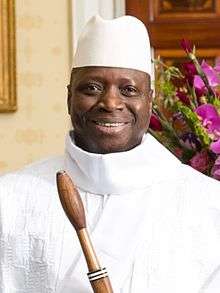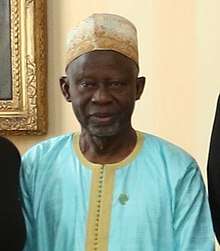2011 Gambian presidential election
Presidential elections were held in the Gambia on 24 November 2011. Incumbent President Yahya Jammeh, in office since seizing power in a 1994 coup, faced Ousainou Darboe of the United Democratic Party and Hamat Bah of the National Alliance for Democracy and Development.[1]
| |||||||||||||||||||||
| Registered | 796,929 | ||||||||||||||||||||
|---|---|---|---|---|---|---|---|---|---|---|---|---|---|---|---|---|---|---|---|---|---|
| Turnout | 83% | ||||||||||||||||||||
| |||||||||||||||||||||
| |||||||||||||||||||||
 |
|---|
| This article is part of a series on the politics and government of the Gambia |
| Constitution |
|
Executive |
|
Legislative |
|
Judiciary |
|
|
Administrative divisions
|
|
|
|
The elections were won by Jammeh,[2] who received 72% of the vote on an 83% turnout.[3]
Electoral system
Voting took place using marbles dropped into coloured containers each containing a gong.[4]
Conduct
The elections were monitored by the African Union who praised the process,[5] European Union, Organisation of Islamic Cooperation and Commonwealth.[4] The Economic Community of West African States (ECOWAS) did not send any monitors because of "an unacceptable level of control of the electronic media by the party in power... and an opposition and electorate cowed by repression and intimidation".[4]
Before the elections Jammeh had claimed "I will never compromise peace and stability at the altar of so-called democracy",[6] that "there is no way I can lose unless you tell me that all Gambian people are mad" and in response to press criticism said "The journalists are less than 1% of the population and if anybody expects me to allow less than 1% of the population to destroy 99% of the population, you are in the wrong place."[7]
On the election day Bah claimed that he had not heard of any intimidation of his supporters[8] although Darboe claimed the vote was fraudulent, rejected the result[7][9][10] and complained of intimidation from the presence of military vehicles on the streets.[11] The Independent Electoral Commission also said there was no intimidation[12] and that "it is impossible to rig elections in Gambia".[8]
There was also criticism of the election organisation as many voters went to the wrong polling station.[4]
Results
| Candidate | Party | Votes | % |
|---|---|---|---|
| Yahya Jammeh | Alliance for Patriotic Reorientation and Construction | 470,550 | 71.5 |
| Ousainou Darboe | United Democratic Party | 114,177 | 17.4 |
| Hamat Bah | United Front | 73,060 | 11.1 |
| Invalid/blank votes | 117 | – | |
| Total | 657,904 | 100 | |
| Registered voters/turnout | 796,929 | 82.6 | |
| Source: Adam Carr | |||
References
- "Gambia: Ecowas observers boycott 'unfair poll'". BBC News. 23 November 2011.
- Bowers, Emily; Touray, Suwaibou (25 November 2011). "Gambia's Jammeh Wins Fourth Term With 71% of Votes Cast". Bloomberg. Retrieved 26 November 2011.
- "Independent Electoral Commission The Gambia" (PDF). Independent Electoral Commission. 2011. Archived from the original (PDF) on 13 January 2012. Retrieved 26 November 2011.
- "Gambia's Jammeh wins disputed elections". Al Jazeera. 2011. Retrieved 26 November 2011.
- "African Union Observers Impressed With Gambia Election". VOA. 2011. Retrieved 26 November 2011.
- "Gambians vote in election condemned as unfair". Los Angeles Times. 24 November 2011. Retrieved 26 November 2011.
'I will never compromise peace and stability at the altar of so-called democracy,'
- "Gambia's Yahya Jammeh wins fourth presidential term". BBC News. 25 November 2011. Retrieved 26 November 2011.
- "Ecowas on the spot over Gambia election". Monitor. 2011. Retrieved 26 November 2011.
- "Welcome to Freedom Newspaper Online". Freedom. 2011. Archived from the original on 27 November 2011. Retrieved 26 November 2011.
- "Jammeh re-elected president of the Republic of Gambia". Xinhua News Agency. 2011. Retrieved 26 November 2011.
- Laing, Aislinn (24 November 2011). "Gambians go to the polls with marbles". The Daily Telegraph. London. ISSN 0307-1235. OCLC 49632006. Retrieved 26 November 2011.
- "Gambian President Wins Re-Election". VOA. 2011. Retrieved 26 November 2011.


_(cropped).jpg)